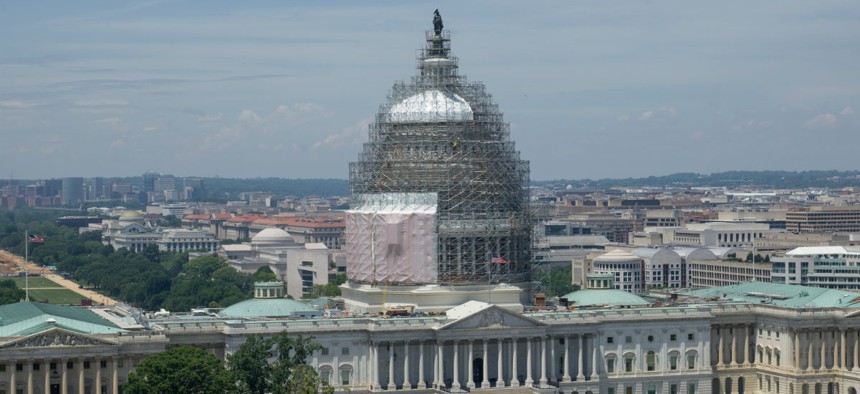
Architect of the Capitol
With House Defiant, Senate Eyes a 2-Month Highway Bill
Neither chamber wants to pass the other's bill, so a 60-day measure has emerged as a possible fallback.
Democrats might be his opposition, but the House is Mitch McConnell's enemy.
Facing an end-of-the-week deadline, a Congress itching to go home for the August recess, and an interchamber gulf over how to fund the nation's roads and whether to revive the Ex-Im Bank, the Senate majority leader's most likely option may be to put forward a bill extending the Highway Trust Fund for two months.
That would be an annoying yet familiar setback for a Senate that hopes to pass a long-term, six-year bill—the longest such reauthorization in a decade.
"You know, it's harder than it looks," said Majority Whip John Cornyn of threading the differences between the House and Senate, which are both controlled by the Republicans for the first time in eight years.
"If they in the end don't take up our bill and pass it, then we could do a short-term two-month extension," added Cornyn. "And then they could pass the House version, and then we could meet in the conference committee to work out the differences."
The House already has passed a five-month patch to give negotiators time to figure out a long-term deal using tax repatriation on corporate profits overseas to pay for future transportation projects. House Majority Leader Kevin McCarthy backed his chamber's bill Monday, and bluntly said, "We're not taking up the Senate bill."
"We are set to depart on Thursday," he added. "How do you bring up a more than 1,000-page bill that deals with it and send it to the House on the day of departure?"
GOP senators are still of the mind-set, as Sen. John Hoeven of North Dakota put it, that the "No. 1" priority is to pass their bill, which is funded for three years in part by cutting dividends paid by the Federal Reserve to large banks. But Hoeven says that GOP members also have talked about a 60-day option.
"I would have an open mind on a 60-day extension if they say that's what they need to truly consider," said Hoeven. "We're trying to stay focused on getting them to agree. We should get this done."
House Republican leaders complain that McConnell's bill does not fully offset the spending it would authorize. Instead, House leaders have said they want to use some tax changes to pay for a longer-term highway bill, an idea McConnell has spurned.
But McCarthy insisted that the House's five-month bill should be taken up, noting that it makes more sense than asking the House to pass another shorter-term bill.
"When you look at a two- to three-month bill, it almost costs you the same as five months," McCarthy said. "So why—if you already have it sitting in the Senate, and it's clean—why wouldn't you take that?"
A two-month patch does have its problems, but Cornyn said one controversial topic would be taken off the table: the reauthorization of the Export-Import bank, which has provided loan guarantees to U.S. exporters for decades until conservatives blocked its charter last month.
The House Republican conference is split on reauthorizing the Ex-Im Bank, as are the chamber's top GOP leaders. Boehner has long said he promised the bank's opponents that if the Senate attaches an extension of the charter to highway funding, he would allow a separate vote on the charter.
Yet a group of pro-Ex-Im Bank Republicans were holding out hope that the Senate would do the hard work for them. They met Monday night with bank proponents, and according to a source in the meeting, the group believes a Senate-passed highway-funding extension with Ex-Im attached to it would allow them a vote in the House to extend the bank's charter.
If, however, the Senate passes a clean extension, the group is pushing leaders to allow them to amend it to add a reauthorization of the bank.
The Senate's short-term fix also would align the debate over how to fund the nation's roads and bridges with the government's overall funding deadline of Sept. 30, which will provoke a spirited battle between those who do and don't want to bust across-the-board caps on spending.
The House's five-month plan, on the contrary, could align the highway fight with a debate over raising the debt ceiling, which could happen sometime between October and December.






